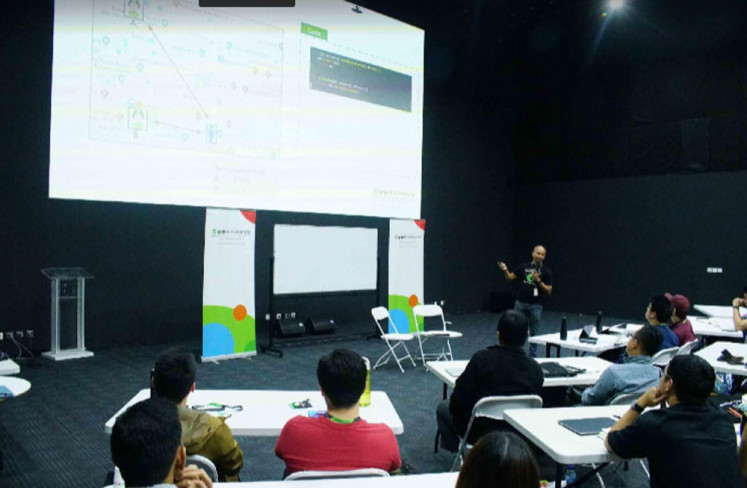
Southeast Asia’s leading super app Gojek has been pushing ahead with its social impact mission through Gojek Xcelerate, a startup accelerator program aiming to help homegrown and APAC startups grow their businesses.
Launched in September last year in collaboration with local startup hub Digitaraya, the third of the planned four-batch program has selected nine mission-aligned startups whose services and products help customers tackle everyday hassles. Participating startups selected through a rigorous screening process out of thousands receive a one-week boot camp with world-class curriculums designed by Gojek and partners, including Google, McKinsey & Co and UBS Bank. After the boot camp, startups have access to exclusive mentorships with McKinsey & Co, before they finally pitch their business at Demo Day in Gojek HQ in front of Gojek’s network of VCs and potential investors.
After the first and second batch focused on machine learning and women founders respectively, the ongoing month-long program focuses on daily consumer innovation to help startups reach their product-market fit, a condition that helps ensure business sustainability. Here, Gojek’s curriculum introduces growth hacking, a method that is crucial in achieving product-market fit.
“In the development of a startup, the founders need to find the most effective and efficient way to develop their products, one great method is through growth-hacking,” Gojek chief marketing officer Ainul Yaqin said.
“This method is similar to the discipline of marketing, where we always strive to market products and services that best suit our target customers, even at the individual level,” he added.
Further, technology and industrial wave 4.0 have a big impact on the retail industry in Indonesia. Along with digitalization, market trends and consumer preferences have also shifted from those that used to depend on distributors and outlets, to direct delivery to consumers.
Consumer expectations of a comfortable and fast experience have increased, and now they want to be able to directly access products or services from the comfort of their homes. As the potential in this online retail and the daily-needs industry is high, so is the competition.
For local startups, to be able to compete and succeed in such a crowded industry, they must continuously innovate and strive to offer products and services that are most suitable for consumers.
Moreover, digitization allows each player to expand their market reach, so startups need to continue to innovate to remain consumers' top choice and create loyalty.
“In growth-hacking, startups analyze consumer behavior data to find the exact solution for consumers’ particular problems, and this is important to help accelerate growth and ensure business continuity,” Ainul says.
Through Gojek Xcelerate, startups are also connected to a global network of investors and have the opportunity to join the Gojek platform.
Daily consumer innovation
More and more Indonesian startups are entering the modern retail industry, which is estimated to grow 10 percent annually.
The digital era is changing the trends in consumer behavior from the retail stores to direct to consumer, wherewith technology the public can more easily access daily needs that are all in the palm of their fingertips.
This requires businesses to continuously innovate, to ensure their offerings remain superior in the market.
Growth hacking
The accelerator program trains startups in applying effective methods to develop products and grow businesses in the most efficient way.
Growth hacking is a product development method through rapid experimental processes, involving marketing channels, product development, sales segmentation, and data analysis.
This method is vital in ensuring the added value of a product or service creation follows market needs - or what is called product-market fit.
Connect to the world
In addition to relevant boot camp curriculums, the accelerator also opens broad access for startup participants to meet mentors from world-class companies such as Google, McKinsey & Co and UBS.
They have the opportunity to pitch in front of investors and global VCs (Venture Capitals) to scale up their business and potentially become the next Indonesian unicorns.
Digitaraya managing director Nicole Yap points out the significance of the startup accelerator program given the 2019 reports that 70 percent of startups did not survive business competition.
“From Google, Temasek and Bain report findings titled e-Conomy SEA 2019, Indonesia has the highest growth in the last five years, with an increase of 49 percent in startup business from 2015 to 2019, and has the potential to reach US$133 billion in the next five years,” she says. However, until 2019 the number of startup failures accounted for more than 70 percent. Forbes magazine mentioned that the failures were driven by premature growth, where startups use funds to improve their existing products rather than testing the product to reach product-market fit.
Nicole added “This is where a startup accelerator helps. Gojek Xcelerate helps give the startups a road map to avoid common failure points and push them to test their assumptions early with mentors and subject matter experts”.
Based on the findings of Google e-Conomy SEA 2019, the internet economy is growing very fast, reaching valuations of up to $100 billion in 2019, with the biggest growth being in the e-commerce sector, with a contribution of $38 billion and is expected to rise to $153 billion by 2025.
“This provides great potential for Southeast Asian startups because there are no visible leaders in a highly diverse and fragmented competition environment,” UBS Bank executive director Riaz Hyder says.
To date, the Gojek Xcelerate program has graduated 24 startups from 7 countries. The impact of the Gojek Xcelerate can extend far beyond the participating startups. With the support needed to grow their offerings, solve problems and create new opportunities on a larger scale, startups hold the potential to uplift the lives of millions of people, enabling social mobility and economic empowerment. The development of the startup ecosystem and local tech talent will also support Indonesia’s rise as an innovation hub and a digital powerhouse in Southeast Asia.